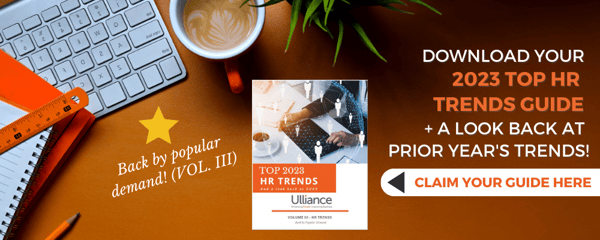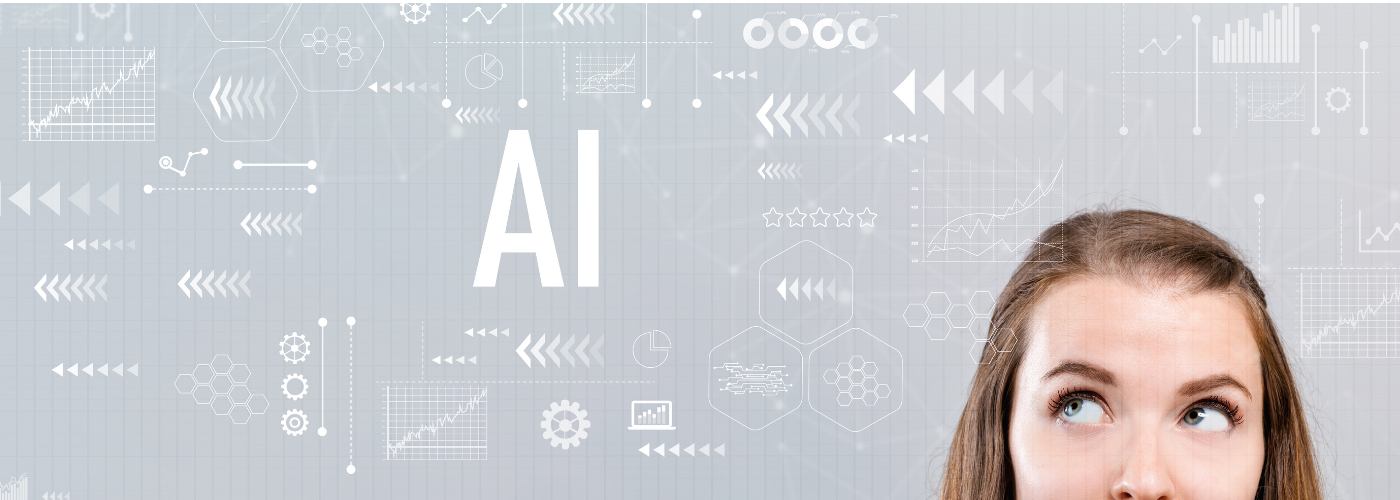Artificial Intelligence (AI) feels impossible to avoid in today’s world. ChatGPT and other similar generative AI are the subject of endless news reports, but AI is not entirely new. The concept of artificial intelligence actually began in the 1950s, though recent advances in computing power and machine learning techniques have brought it to the forefront for many successful organizations.
Human resources departments are no exception. The potential of AI in revolutionizing HR practices has garnered significant attention in recent times.
The Promise of Artificial Intelligence for Human Resources
Artificial intelligence holds immense promise for human resources departments, offering opportunities to automate and streamline processes, optimize decision-making, and enhance the overall efficiency of operations. By leveraging AI technologies, HR professionals can free up valuable time and resources, giving them more time to focus on strategic initiatives and other activities that add more value to the organization.
Here are key HR functions where AI can be particularly advantageous:
Recruitment and Talent Acquisition
The traditional recruitment process can be time-consuming and prone to bias. AI-powered tools can analyze resumes and job applications, sifting through vast amounts of data to identify the most suitable candidates based on specific criteria such as skills, qualifications, and experience. By leveraging machine learning algorithms, AI can also help predict candidate success, reducing bias in the hiring process and promoting diversity and inclusion.
Employee Onboarding
The onboarding process sets the tone for an employee's experience within an organization. AI-powered chatbots can provide new hires with immediate support and answers to frequently asked questions, guiding them through the initial stages of their employment journey. This ensures a smooth and personalized onboarding experience, enhancing employee satisfaction and reducing the workload for HR personnel.
Employee Engagement
Ensuring a high level of employee engagement is crucial for organizational success. AI can be a powerful ally in this regard. By analyzing employee feedback, surveys, and even social media interactions through sentiment analysis, AI can measure employee sentiment and help HR departments identify trends, address issues, and develop targeted strategies to improve engagement and foster a positive work culture.
Performance Management
AI-based performance management systems can provide data-driven insights into employee performance, helping HR professionals identify top performers, address skill gaps, and make informed decisions regarding promotions and compensation. By leveraging AI algorithms, HR departments can enhance objectivity, fairness, and accuracy in performance assessments.
Learning and Development
Personalized learning experiences can significantly contribute to employee growth and skill development. AI can play a pivotal role in this area by recommending tailored training programs based on individual employee needs, learning styles, and career aspirations. Additionally, AI-powered chatbots can deliver instant learning support, making learning more accessible and efficient.
Employee Retention
Retaining top talent is a priority for every organization. AI algorithms can help predict employee attrition by analyzing various data points such as performance, engagement, and demographic information. This information allows HR departments to proactively identify potential flight risks and implement targeted retention strategies, ultimately reducing turnover and enhancing employee satisfaction.

Legal and Ethical Considerations
While the potential benefits of AI in HR are significant, there are legal and ethical considerations that human resources professionals must address.
For example, an AI-powered recruiting tool at Amazon was designed with the aim of automating the screening and selection of job applicants. However, the AI algorithm was trained on historical resumes submitted to the company, which were predominantly from male applicants. As a result, the system learned to favor male candidates and downgraded resumes containing terms associated with women. This raised concerns about gender bias in the hiring process. Amazon eventually abandoned the project after realizing the issues with the AI system.
It is crucial to ensure that AI systems comply with existing employment laws and regulations, particularly in areas concerning discrimination, privacy, and data protection.
Discrimination and Bias
Discrimination and bias are critical concerns when employing AI in HR processes. AI algorithms rely on training data, and if that data contains biases, such as gender or racial disparities, the AI system may inadvertently perpetuate those biases.
HR departments must remain vigilant in monitoring and auditing AI systems to identify and rectify any discriminatory outcomes. Regular calibration and validation of AI models can help mitigate the risk of biased results and ensure fairness.
Privacy and Data Protection
AI systems rely on vast amounts of employee data, including personal information. HR departments must adhere to data protection regulations, such as the General Data Protection Regulation (GDPR) in the European Union, to safeguard employee privacy.
Adequate measures should be in place to securely store and limit access to sensitive information, ensuring that employees' data is managed responsibly.
"92% of HR leaders are planning on increasing their use of AI in at least one area of HR in the next 12-18 months."
~ Eightfold AI's Talent Survey
Effectively Using Artificial Intelligence in HR
Companies should take proactive measures and establish robust guidelines and processes when they use artificial intelligence as part of the human resources function. Collaboration with an employee assistance program (EAP) provider can help in setting up policies and processes to ensure compliance with privacy laws and maintain data security.
5 Key Strategies for Implementing AI in HR Effectively, legally and ethically:
-
Clear Policies and Transparency- companies should develop comprehensive policies and guidelines that outline the purpose, scope, and limitations of AI in HR. These policies should be communicated transparently to employees, ensuring they understand how AI is being utilized, what data is collected, and how decisions are made. Transparency builds trust and helps employees feel informed and included in the processes.
-
bias mitigation and algorithimic fairness- Companies must be vigilant in addressing biases that can arise in AI algorithms. Regular audits and assessments should be conducted to identify and rectify potential biases. Additionally, organizations should invest in diverse and representative training data to minimize biases and promote algorithmic fairness. Collaboration with AI experts and data scientists can help in designing and fine-tuning AI models to ensure fairness and accuracy.
-
Privacy and security monitoring is crucial. the protection of employee data is paramount. Companies must adhere to applicable data protection laws and regulations, such as GDPR, and implement robust data privacy and security measures. This includes securing data storage, implementing access controls, and obtaining informed consent for data collection and processing.
Continuous monitoring and auditing of AI systems are essential to identify and address any issues promptly. Regular assessments of AI models and data can help ensure compliance, identify biases, and maintain the effectiveness and fairness of AI-driven HR processes.
-
Informed consent and opt-out options- companies should provide employees with clear information about the use of AI in HR and obtain their informed consent where necessary. Employees should have the right to opt out of certain AI-enabled processes if desired, such as automated decision-making or AI-driven performance assessments. Respect for employee autonomy and choices reinforces ethical AI practices.
-
Employee support and education- companies should prioritize employee support and education to alleviate concerns and foster trust. Collaborating with an EAP provider can offer valuable resources, such as counseling, training, and support for employees impacted by AI-driven HR processes. Employee education programs can help in understanding the benefits and limitations of AI, addressing misconceptions, and promoting responsible and ethical AI use within the organization.
Properly Executed AI Can Transform HR
The integration of AI in HR departments has the potential to transform various HR functions, enhancing efficiency, equity, and overall employee experiences. AI can automate processes, improve decision-making, and drive organizational success.
However, HR professionals must navigate the legal and ethical considerations associated with AI adoption.
When you partner with Ulliance, our Life Advisor Consultants are always just a phone call away to teach ways to enhance your work/life balance and increase your happiness. The Ulliance Life Advisor Employee Assistance Program can help employees and employers come closer to a state of total well-being.
Investing in the right EAP or Wellness Program to support your employees will help them and help you. Visit https://ulliance.com/ or call 866-648-8326.
The Ulliance Employee Assistance Program can address the
following issues:
• Stress about work or job performance
• Crisis in the workplace
• Conflict resolution at work or in one’s personal life
• Marital or relationship problems
• Child or elder care concerns
• Financial worries
• Mental health problems
• Alcohol/substance abuse
• Grief
• Interpersonal conflicts
• AND MORE!
Have some questions about our services? Book a quick meeting below!
References:
7 Ways Artificial Intelligence Is Reinventing Human Resources, Dom Nicastro, CMSWire;
https://www.cmswire.com/digital-workplace/7-ways-artificial-intelligence-is-reinventing-human-resources/
2022 Talent Survey, Eightfold AI;
https://eightfold.ai/wp-content/uploads/2022_Talent_Survey.pdf
Artificial Intelligence in the Workplace, American Bar Association;
https://www.americanbar.org/groups/labor_law/publications/labor_employment_law_news/spring-2022/ai-in-the-workplace/
Amazon Scraps Secret AI Recruiting Tool That Showed Bias Against Women, Reuters; https://www.reuters.com/article/us-amazon-com-jobs-automation-insight-idUSKCN1MK08G
Ways AI Is Changing HR Departments, Gem Siocon, Business News Daily, https://www.businessnewsdaily.com/how-ai-is-changing-hr
Using AI In Human Resources: Benefits and Risks, Human Resources Blog, Gold & Ratner; https://www.humanresourceslawblog.com/using-ai-in-human-resources-benefits-and-risks/

